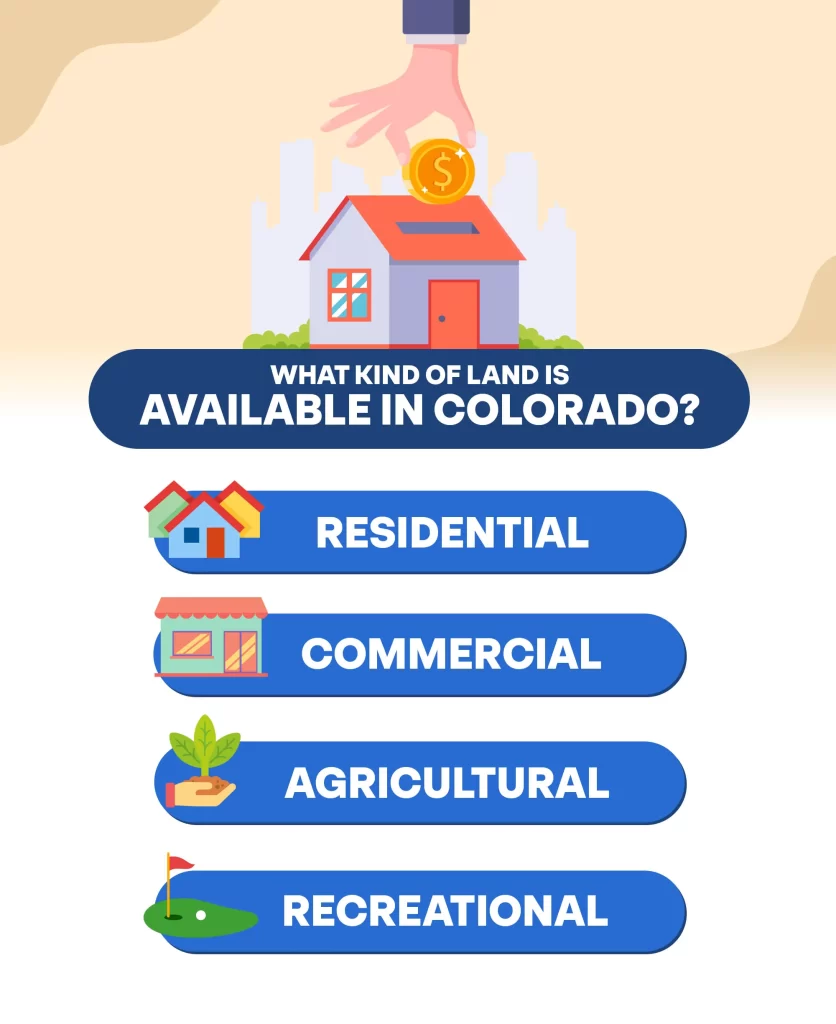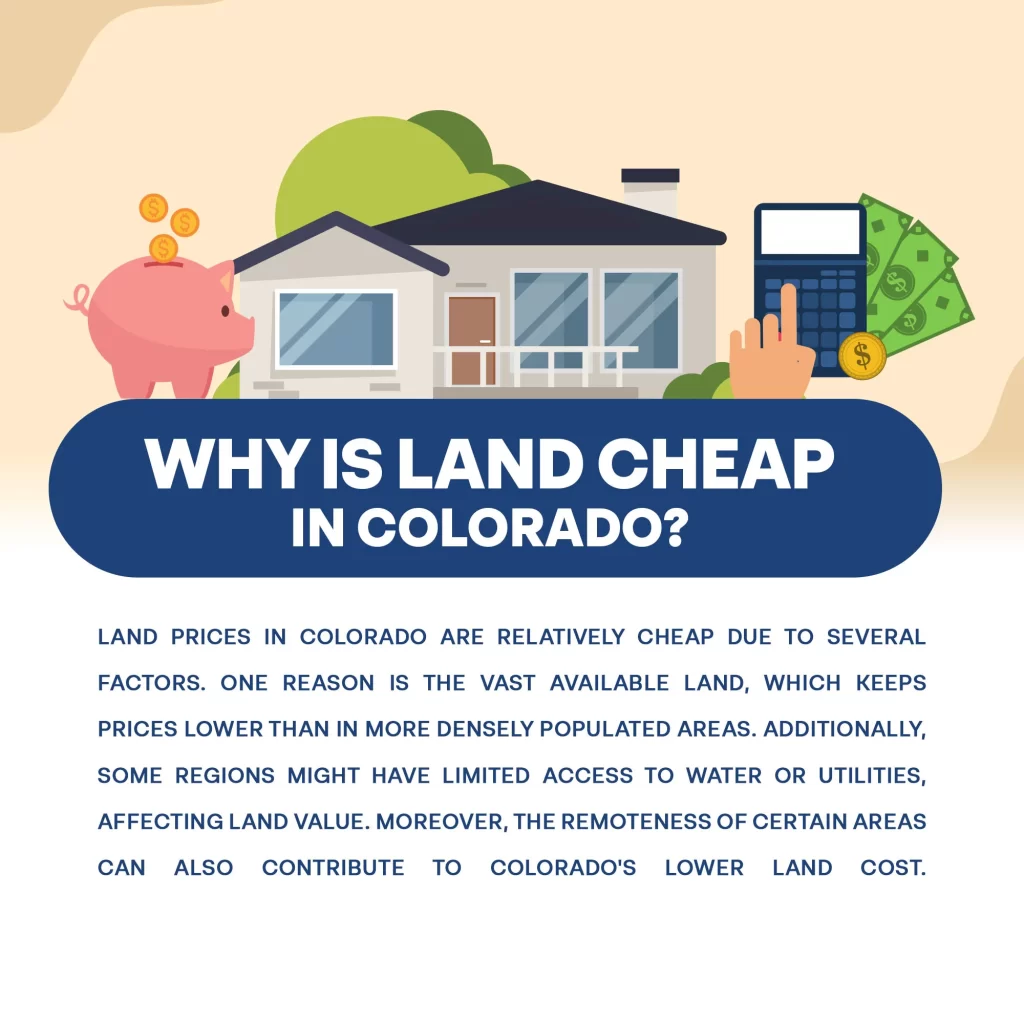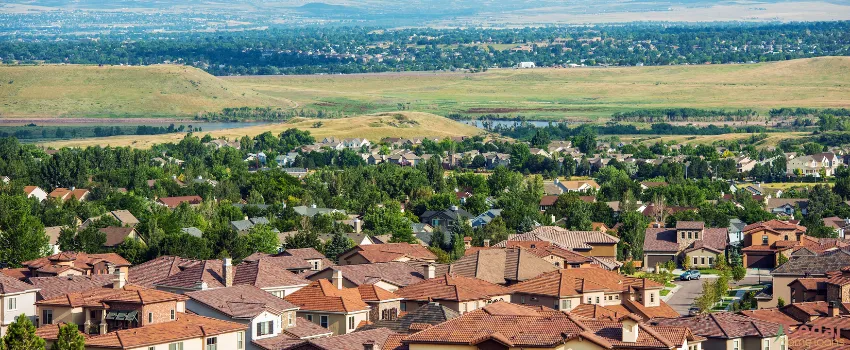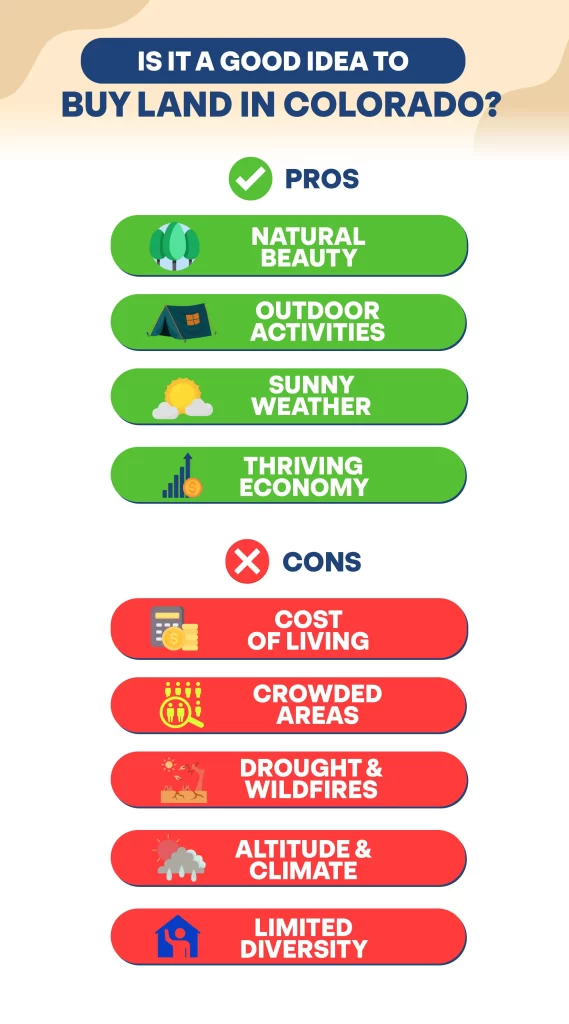People buy land in Colorado for many reasons: it could be a long-term investment, recreational, residential, agricultural, conservation, or business use. Whatever the reason, it’s essential to check the pros and cons of living in Colorado to make an informed decision.
By thoroughly assessing the pros and cons of buying land, you can check if the investment aligns with your lifestyle, goals, and preferences. Let this blog guide you through buying land in Colorado for your investment.
What Kind of Land is Available in Colorado?
Colorado is known for its various land formations, such as mountains, plains, plateaus, and farmlands. If you’re searching for vacant land in Colorado for sale, here are the available types and their respective zoning regulations.
1. Residential
Residential lands are located within suburban areas and cities and can access essential utilities like electricity, water supply, sewerage system, and gas lines. As a buyer, it’s best to research the different zoning regulations for each area since they vary between municipalities and counties. Do note that key zoning considerations in Colorado involve the following:
- Minimum lot size
- Allowable land use
- Building height restrictions
- Environmental protection provisions
- Setback requirements
2. Commercial
If you’re buying land in Colorado for a business, commercial land is what you’re looking for. Commercial land is ideal for businesses like office spaces, hotels, restaurants, retail stores, etc.
Compared to residential lands, commercial homes require more complex and specific allowances in design and usage restrictions. The key zoning considerations for Colorado’s commercial land use include:
- Building Size
- Height Restrictions
- Signage Limitations
- Landscaping Regulations
- Parking Requirements
Additionally, zoning requirements may also depend on the type of business or industry for which the building will be used. Certain areas, like those within enterprise zones, might need special conditions.
3. Agricultural
Aside from residential and commercial use, people also buy land in Colorado for agricultural purposes like growing crops or raising livestock. This type of land requires additional zoning laws depending on the amenities and infrastructures you will place on your ground. These guides and rules are available on the Colorado Department of Agriculture’s website.
4. Recreational
Investors can use recreational lands for outdoor activities like fishing, camping, and hunting. Some even buy recreational lands for eco-tourism businesses. If you’re planning on buying land in Colorado for recreational purposes, you should look into environmental and wildlife protection laws, which can limit certain recreational activities.
Why is Land Cheap in Colorado?
Land prices in Colorado are relatively cheap due to several factors. One reason is the vast available land, which keeps prices lower than in more densely populated areas. Additionally, some regions might have limited access to water or utilities, affecting land value. Moreover, the remoteness of certain areas can also contribute to Colorado’s lower land cost.
Can You Claim Land in Colorado?
In Colorado, you must follow the proper legal procedures to claim the land as your own. Land ownership in Colorado is determined by a system called adverse possession. It requires meeting specific criteria and going through a legal process to gain ownership of land you have occupied without permission for a certain period.
You should consult legal professionals or authorities to understand the specific requirements and process for claiming land in Colorado.
How to Buy Land in Colorado?
Buying land in Colorado mountains or other landforms is best with the help of a professional land broker. They have the best Colorado real estate market knowledge and can help you find the best land that matches your goals.
As for the financing aspect, some of the standard methods people use in buying land in Colorado include:
- Land Loans – These typically have shorter repayment terms and higher interest rates than traditional mortgages. They are applicable for less developed and underdeveloped properties. However, less developed lands tend to have higher interest rates.
- Seller Financing – This is also called carryback mortgage, which pertains to getting a loan directly from the seller, and you can pay it to them now over time. Usually, seller financing comes with fewer qualifications but higher interest rates.
- Home Equity Loans – These are options for finding loans with lower interest rates. However, remember that home equity loans use your home as a security, making it collateral in case of non-payment.
- Government Programs and Grants – These are from institutions like the USDA that provide various loans for those buying agricultural land. There are also state-specific programs like the Colorado Private Activity Bonds program to assist you in your investments.
Is It a Good Idea to Buy Land in Colorado?
This varies on certain factors and conditions and your preferences. You can weigh the pros and cons of living in Colorado to see if the living conditions and real estate rules match your expectations and lifestyle. Here are some of them:
1. Pros
- Natural Beauty – Colorado is renowned for its stunning natural beauty, majestic mountains, scenic landscapes, and numerous outdoor recreational opportunities. Colorado has it all, whether you enjoy hiking, skiing, camping, or being surrounded by picturesque scenery.
- Outdoor Activities – The state offers various outdoor activities throughout the year. Some activities include skiing, snowboarding, hiking, mountain biking, and rafting.
- Sunny Weather – Colorado has around 300 days of sunshine annually, making it ideal for those who enjoy a sunny climate. The relatively low humidity also appeals to many people.
- Thriving Economy – Colorado’s economy has been growing steadily in recent years. The state has a diverse economy, with solid sectors such as aerospace, technology, tourism, and outdoor recreation.
2. Cons
- Cost of Living – The cost of living in Colorado can be relatively high, particularly in popular areas such as Denver and Boulder. Housing prices have been rising, and rental costs can be steep.
- Crowded Areas – Colorado’s popularity has led to an influx of people moving to the state, especially in urban areas. As a result, cities like Denver have experienced increased traffic congestion, longer commute times, and overcrowded public spaces.
- Drought and Wildfires – Colorado is prone to droughts, particularly in the southern and western regions of the state. This can lead to water shortages and an increased risk of wildfires during dry seasons, posing challenges for residents and the environment.
- Altitude and Climate – Colorado’s high elevation can take some time, especially for individuals not accustomed to higher altitudes. The state also experiences significant temperature fluctuations, with cold winters and hot summers in certain areas.
- Limited Diversity – Colorado’s population is relatively homogeneous compared to some other states, which can result in less ethnic and cultural diversity in certain areas. However, this can vary depending on the specific city or neighborhood.
Why Buy Land in Colorado?
“Is buying land in Colorado a good investment?” is one of the questions many property investors are wondering about. Thanks to its stunning landscapes, Colorado is among the most desired places to live by most aspiring property owners.
Along with its natural beauty, Colorado is also filled with attractions perfect for outdoor enthusiasts. Additionally, Colorado offers plenty of amenities, recreational activities, and job opportunities. The centennial state’s job market has been one of the most consistent and strongest in the United States since the mid-90s.
What Are the Risks of Buying Land in Colorado?
When weighing the pros and cons of living in Colorado, it’s essential to check the downsides. As with any real estate investment, buying land in Colorado also comes with risks. Here are some risk factors to be aware of:
1. Severe Weather
The weather and seasons in the state are both pros and cons of living in Colorado. The state has blue skies but is also prone to severe weather like wildfires, flooding, hailstorms, thunderstorms, and avalanches.
2. Surrounding Wildlife
If you’re buying land in Colorado mountains, you can expect a few wildlife visitors now and then. Depending on the location, some lands in Colorado are close to wildlife animals, which can be dangerous, especially when dealing with large animals.
3. Long Commute Times
Some land and areas in Colorado might be challenging to access because of rugged terrain or limited road access. Because of this, you should be prepared for long commute times when going out for work or errands.
4. Additional Expenses and Taxes
As mentioned earlier, Colorado has one of the lowest property taxes, but it does not apply to vacant and undeveloped lots, with a whopping 28% tax. You must also pay for essential utilities like installing water pipelines and sewer systems.
Is There a Downside to Buying Land?
Considering the pros and cons of buying land is vital before deciding. While owning land can offer potential benefits like investment opportunities, privacy, and the freedom to use the property as you wish, there are also downsides. Some drawbacks include ongoing maintenance costs, property taxes, and the possibility of limited access to utilities or services, depending on the location.
The Bottom Line
Colorado is one of the most sought-after states regarding real estate investments. Before buying, it’s best to consider the pros and cons of living in Colorado to make the right decision.
The benefits of buying land in Colorado include the availability of zoning flexibility, natural beauty, recreational activities, and potential investment returns. Meanwhile, risks include zoning limits, water availability, natural catastrophes, environmental issues, infrastructural requirements, and wildlife interactions. To make an informed conclusion and to assess the pros and cons of buying land, extensive research and professional advice are necessary.
Buy your dream land investment with the help of Cedar Home Loans.
Buying a land investment requires excellent preparation — especially regarding the cost and expenses. If you’re looking for reliable Colorado home loans to finance your investments, choose Cedar Home Loans as your loan provider.
We offer comprehensive mortgage solutions and the best rates that help investors purchase their dream properties within their budget. Contact us today so we can help you secure your property!









